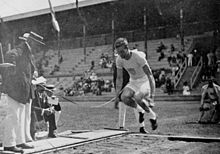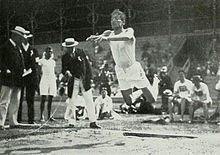The standing long jump, also known as the standing broad jump, is an athletics event. It was an Olympic event until 1912. It is one of three standing variants of track and field jumping events, which also include the standing high jump and standing triple jump.




In performing the standing long jump, the jumper stands at a line marked on the ground with the feet slightly apart. The athlete takes off and lands using both feet, swinging the arms and bending the knees to provide forward drive. The jump must be repeated if the athlete falls back or takes a step at take-off.
In the early part of the nineteenth century the standing long jump was a popular event at highland games and military sports, but very few of these performances were measured. On Friday 8 July 1853 the 93rd Sutherland Highlanders held their annual Highland Games on Chobham Common at which Private J. Forbes cleared 9ft 3in (2.82m) in the standing long jump.[1]
John Scriven of Cambridge University also cleared 9ft 3in (2.82m) at the St John's College Sports at Fenner's cricket ground on Thursday 15 March 1859.[2] Less than a week later, on the first day of the Cambridge University Sports on Monday 21 March, William Howard, of Trinity College, Cambridge, cleared 10ft 2in (3.10m).[3][4]
At the annual regimental sports of the 24th Regiment, at Shorncliff Camp, near Cheriton in Kent, on Thursday 16 September 1864, three men cleared ten feet. Private Lynch cleared 10ft 6in (3.20m), Private Mullis 10ft 3in (3.12m), and Private Crosey 10ft 1in (3.07m).[5]
Huddersfield Athletic Club held their first Annual Athletics Festival at the Rifle Ground, Trinity Street, Huddersfield, on Saturday 24 June 1865, at which two men, W. N. Haigh and J. W. Rhodes, tied at 10ft 8in (3.25m).[6][7][8]
Two months later, on Friday 18 August 1865, at Duns, in the borders of Scotland, around fifteen miles west of Berwick-upon-Tweed, at a meeting of Duns Athletic Club, W. Allen cleared 10ft 9in (3.27m) in the standing long jump and 32ft 2in (9.80m) in the standing triple jump.[9]
Eleven feet was first cleared less than a week later. On Saturday 14 August 1865, Private Rushton (H Troop) cleared exactly 11ft 0in (3.35m) at Aldershot during the Regimental Sports of the 14th Hussars.[10]
Ten months later, on Saturday 24 June 1866, two men cleared eleven feet. At the second Annual Athletic Festival of Huddersfield Athletic Club both M. H. Bradley and J. W. Rhodes cleared 11ft 0in (3.35m) at the Rifle Ground, Trinity Street, Huddersfield.[11][12]
Exactly one year after that, at the third annual festival of Huddersfield Athletic Club on Saturday 13 July 1867, J. Duckworth, of Haslingden Athletic Club, cleared 11ft 3 1/2in (3.44m).[13][14]
At Carrick-on-Suir in County Tipperary in southern Ireland, fifteen miles north west of Waterford, on Monday 1 April 1872, Maurice Davin, a farmer who later became the first President of the Gaelic Athletic Association (GAA), cleared 11ft 6in (3.50m). He also won the 56lb weight throw at 26ft 4in (8.02m), the shot put (17lb) with 38ft 8in (11.78m), the hammer (16lb) 98ft 0in (29.88m), the standing triple jump 32ft 7in (9.93m), and had a walkover in the high jump.[15]
On Saturday 13 May 1876, at the Chuckery Ground, Walsall, during the Second Annual Athletic Sports of Walsall Cricket & Football Club, A. B. Lindop jumped 11ft 10in (3.60m).[16][17]
Ray Ewry set the first world record for the standing long jump at 3.47 m (11 ft 4+1⁄2 in) on September 3, 1904. The current unofficial record is held by Byron Jones, who recorded a jump of 3.73 m (12 ft 2+3⁄4 in) at the NFL Combine on February 23, 2015,[18] beating the official world-record jump distance of 3.71 m (12 ft 2 in) set by Norwegian shot putter Arne Tvervaag from Ringerike FIK Sportclub in 1968, in a different setting with different controls.[19]
France held national championships at standing long jump and standing high jump for men from 1905 to 1920, and for women from 1917 to 1926. Their first standing long jump champions were Henri Jardin (Racing Club de France) 3.04m (9ft 11 3/4in), and Suzanne Liebrard (Fémina Sports) 2.215m (7ft 3in).[20]
When indoor arenas were built, the standing long jump began to disappear as an event. Today, Norway is the only country where the standing long jump is a national championship event. The Norwegian Championships in Standing Jumps (long jump and high jump) has been held in Stange every winter since 1995.[21][22]
The standing long jump is also one of the events at the NFL combine,[23] it was one of the standardized test events as part of the President's Award on Physical Fitness,[24] as well as the physical fitness test that officer cadets must complete at the Royal Military College of Canada and the United States Air Force Academy.[25] In the Brazilian police forces, a minimum performance in a standing long jump test is required to join the Federal Police (2.14 m for men 1.66 m for women[26]) and the Federal Highway Police (2.00 m for men 1.60 m for women).[27]
Olympic medalists
editIntercalated Games
edit| Games | Gold | Silver | Bronze |
|---|---|---|---|
| 1906 Athens |
Ray Ewry (USA) | Martin Sheridan (USA) | Lawson Robertson (USA) |
References
edit- ^ Field, Sat 16 Jul 1853 p. 15
- ^ Bell's Life, Sun 20 Mar 1859 p. 7
- ^ Cambridge Independent Press, Sat 26 Mar 1859 p. 8
- ^ Cambridge Chronicle, Sat 26 Mar 1859 p. 4
- ^ Folkestone Chronicle, Sat 24 Sep 1864 p. 8
- ^ Leeds Mercury, Mon 26 Jun 1865 p. 3
- ^ Huddersfield and Holmfirth Examiner, Sat 1 Jul 1865 p. 7
- ^ Huddersfield Chronicle, Sat 1 Jul 1865 p. 7
- ^ Bell's Life, Sat 26 Aug 1865 p. 7
- ^ Army and Navy Gazette, Sat 21 Oct 1865 p. 2
- ^ Sheffield Daily Telegraph, Mon 25 Jun 1866 p. 3
- ^ Huddersfield Chronicle, Sat 30 Jun 1866 p. 7
- ^ Manchester Courier, Mon 15 Jul 1867 p.\ 3
- ^ Huddersfield Chronicle, Sat 20 Jul 1867 p.\ 6
- ^ Waterford Standard, Sat 6 Apr 1872 p. 3
- ^ Birmingham Mail, Mon 15 May 1876 p. 3
- ^ Walsall Observer, Sat 20 May 1876 p. 3
- ^ Byron Jones obliterates the Combine broad jump record - NBC Sports
- ^ "Norske rekorder for Menn Senior pr" (in Norwegian). Archived from the original on May 29, 2012. Retrieved September 2, 2011. - Norwegian Athletics Association
- ^ French Championships
- ^ "Friidrett Statistikk". www.friidrett.no (in Norwegian). Retrieved December 31, 2018.[dead link] - Norwegian Athletics Association
- ^ Norwegian indoor championships - GBR Athletics
- ^ "Combine events: Broad jump". NFL.com. 2008. Archived from the original on November 5, 2012. Retrieved August 8, 2010.
- ^ "President's Council on Sports, Fitness & Nutrition (PCSFN)". HHS.gov. January 10, 2017.
- ^ webmaster.rmc (March 23, 2015). "Department of Athletics". www.rmc-cmr.ca.
- ^ EDITAL Nº 55/2014 – DGP/DPF, DE 25 DE SETEMBRO DE 2014
- ^ EDITAL Nº 1 – PRF – POLICIAL RODOVIÁRIO FEDERAL, DE 11 DE JUNHO DE 2013